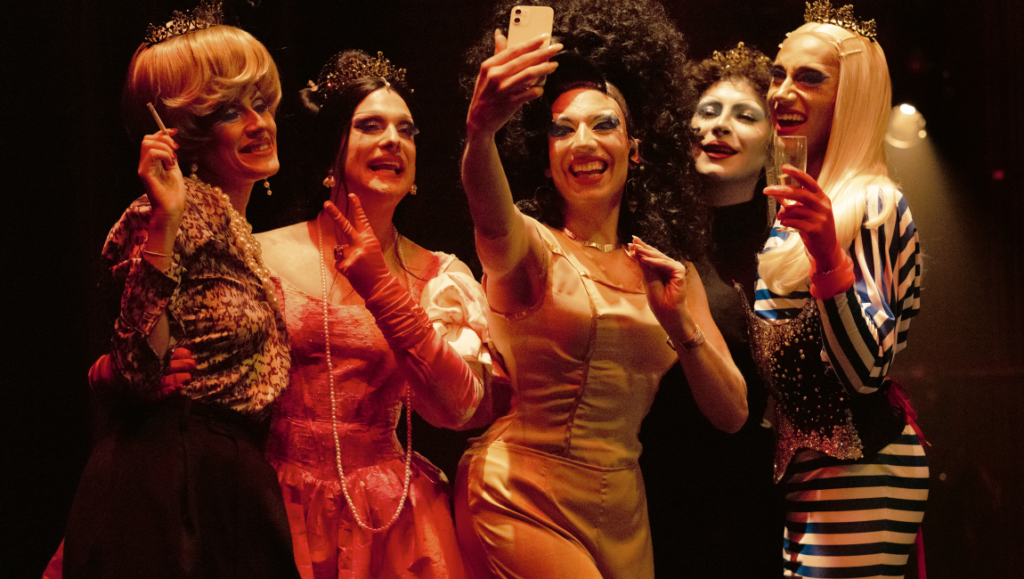Three Nights a Week is less the love story between a straight man and a drag queen it has been billed as, and rather a love letter to a subculture and the invitations that it opens. Photographer Baptiste (Pablo Pauly) is ostensibly straight. He visits a World AIDS Day awareness event that his girlfriend Samia (Hafsia Herzi) is involved with, intending to use some of the local drag scene in his art. Though he is intrigued by the images of freedom through performance and the glitter from ashes on an artistic level, one particular queen does catch his eye. Cookie Kunty (Romain Eck) is strangely hypnotic and calming, whether through Baptiste’s eyes or not, and, as she takes a slow, practiced drag of a cigarette lit, with confidence, by a male admirer; more alluring to him than she is to Samia, and a reminder of Baptiste’s marriage to another, matte-r world.
The relationship begins just like so many on screen: a love story between the idea of a man and the idea of a woman. Only it’s not long before Baptiste finds himself running into Quentin, the man behind the magic, and reconciling the reality of a gay relationship with the larger-than-life partner he has in Cookie proves hard at first. Even Quentin is shyer without the avatar of Cookie, hiding painted nails from a server and markedly less overwhelmed with confidence by his lover’s side. But the “it’s not guys, it’s just him” (though in this case, it’s just her, to begin with) excuse is trite and uninteresting even with the genderplay twist, and Baptiste’s insistence to his girlfriend as their relationship devolves — that this is an exception, not a rule for him — may be sometimes realistic but narratively does feel like conflict invoked for the sake of romantic complication, somewhat unnecessary when the leads have chemistry from the start.
The introduction of Baptiste’s queerness via the avatar of Cookie Kunty recontextualizes drag not as a final art in visible queerness, but as an inviting exploratory space for desire. Queer femininity isn’t an object of fear for him, but one of familiarity, painted not in proximity to heterosexual gender performance but in homage to it. At the start, he may still be primarily in the world of heterosexuality, but a few nights a week, starting slowly, Baptiste is eased into his own desires through his own art. As a photographer, he is initially stricken by the image of Cookie as one of purer expression; it’s only a matter of time before he realizes how closely that image is tied to his own hand. Cookie, and many of the other queens in the Paris scene, exemplify the convoluted image of what men are told they should desire in women. They are gracious yet spirited, curvy yet padded and corseted in the right places to match an image, confident yet bound to an audience. It’s no wonder that even the most blazing personality in the room allows Baptiste the safe space to explore his queerness: she is what he believes in.
That Baptiste’s wide-eyed wonder at his first queer love is so authentic, as is the film’s immersion in European drag culture, is thanks to the first-hand experience of many of the cast and crew. Director Florent Gouëlou has performed as drag queen Javel Habibi by night, but he is not alone in his ties to the scene; Eck’s Cookie Kunty persona has existed for years, and although Three Nights a Week is a fictionalized story when it comes to Quentin, Cookie as a stage persona is very much real. This personal respect for drag as an art form means that the performance spaces and club scenes hardly feel staged (beyond a literal one), and the nightlife is vibrant and beautifully lit. The authenticity is a large part of why the more grounded social points — where the glamorous romance pauses to remind our lovers of its historical reality: a culture decimated by AIDS and social homophobia — don’t feel out of place, because they are just as much a mark on the scene as the swept-away romance is.
Published as part of InRO Weekly — Volume 1, Issue 10.


Comments are closed.